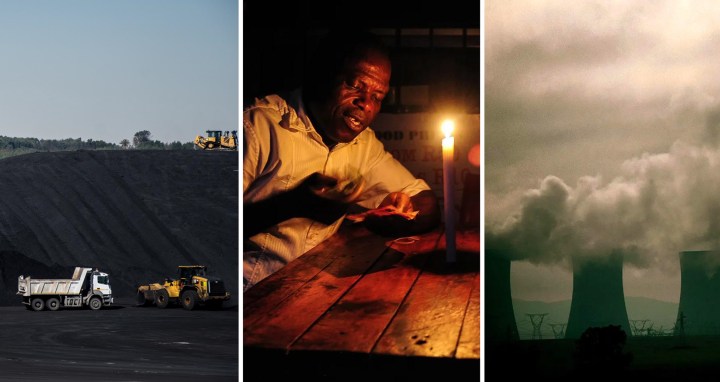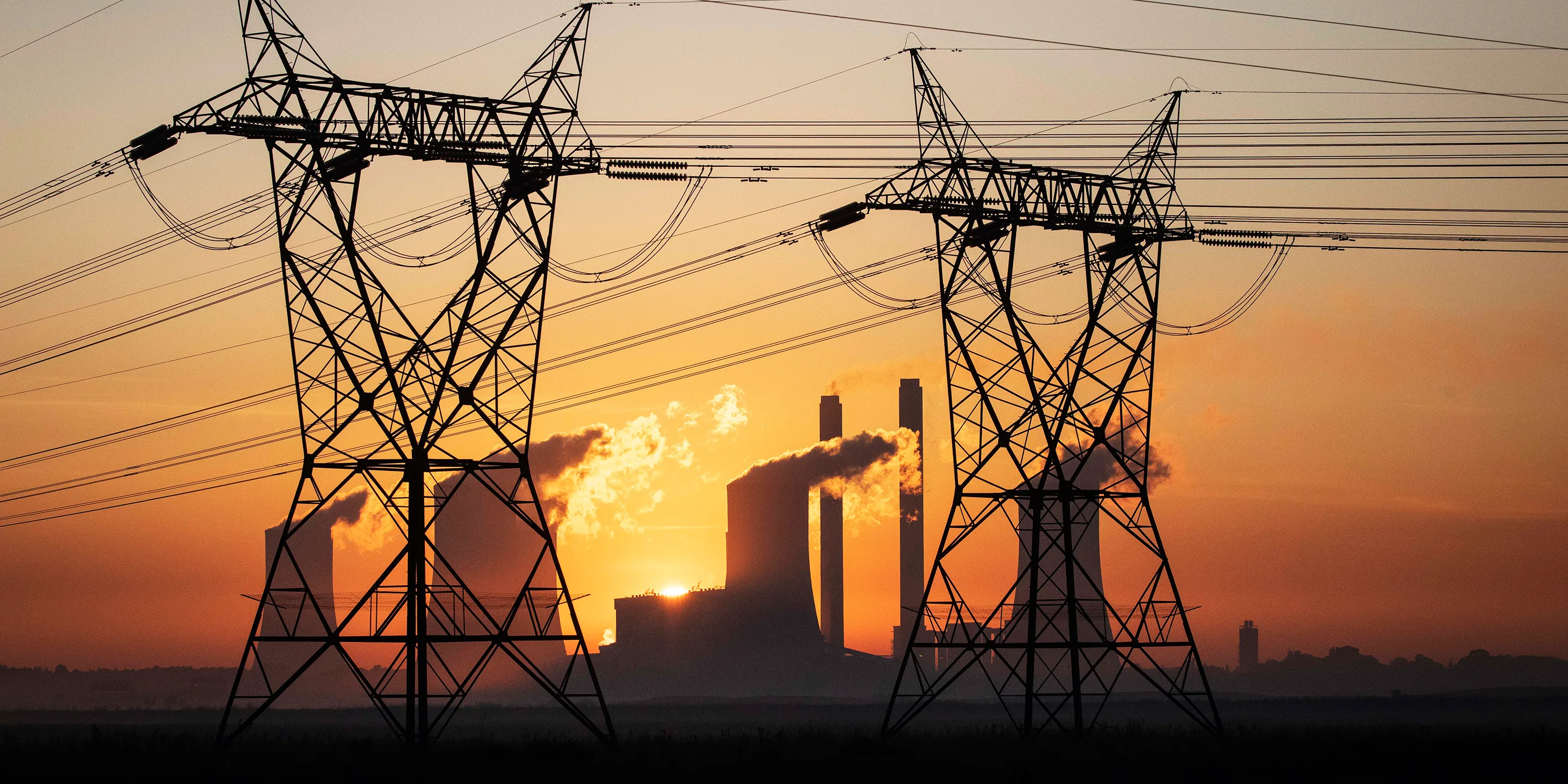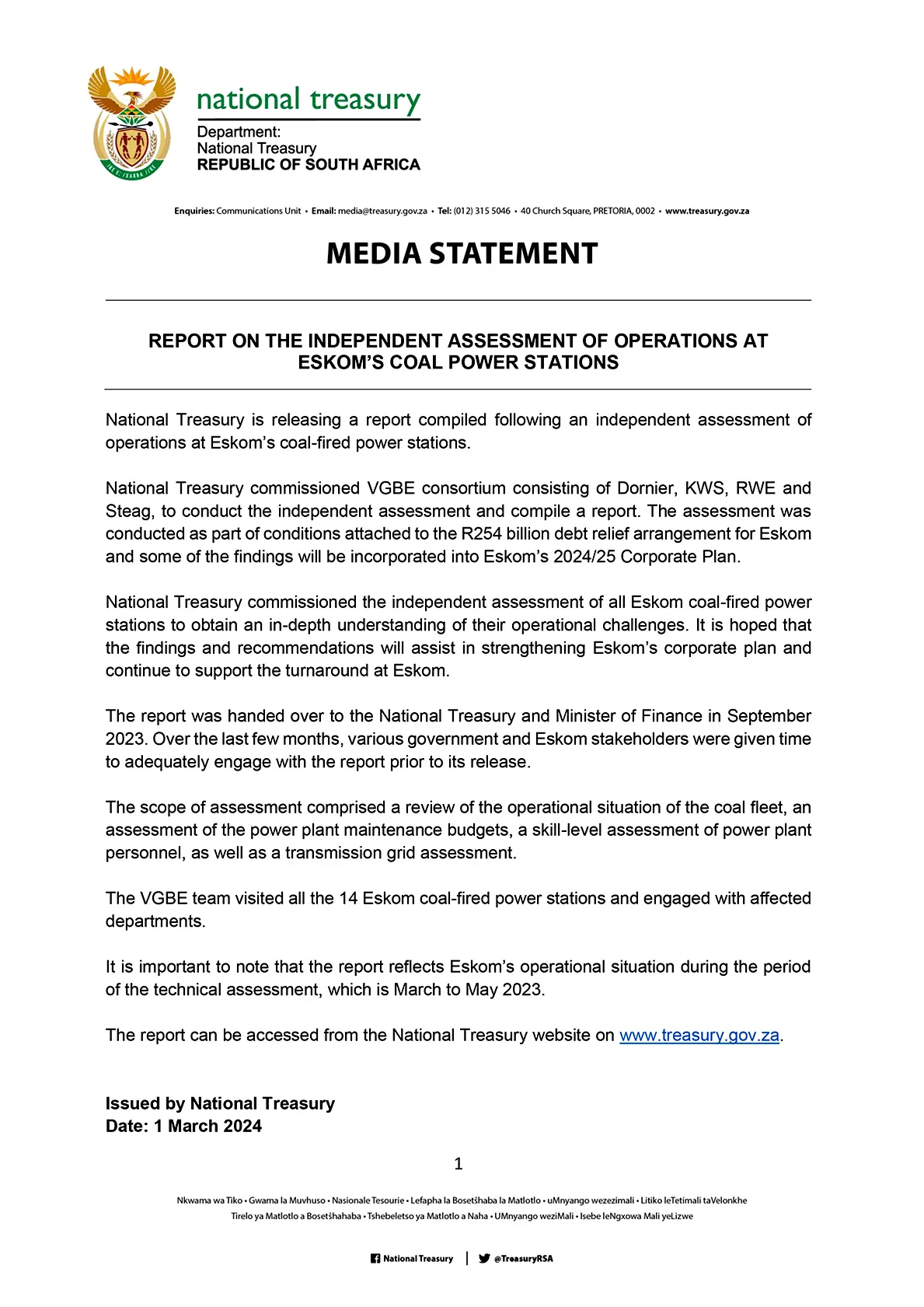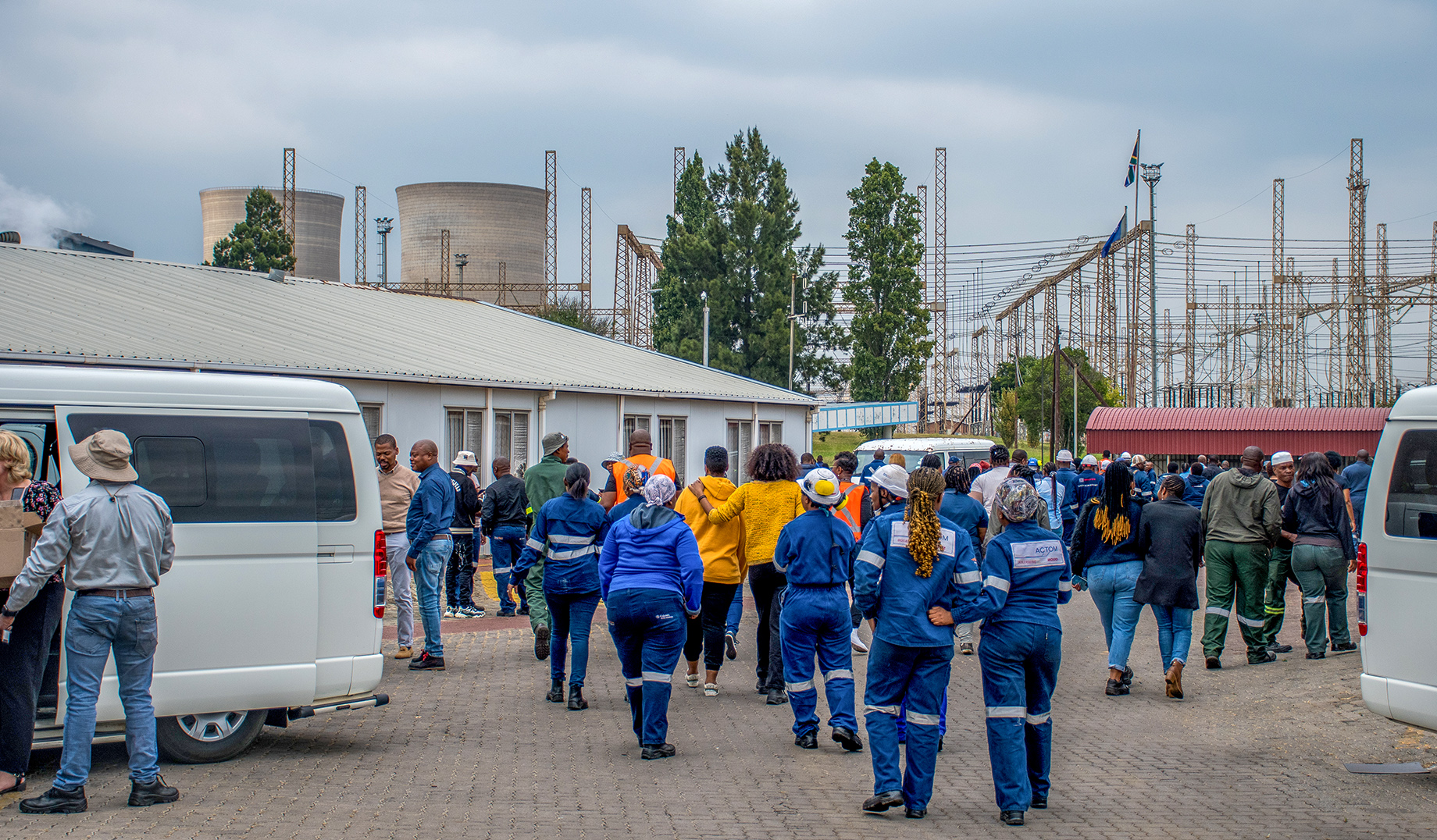UNDER SCRUTINY
‘Dysfunctional and too complex’ — Independent Eskom assessment makes damning load shedding findings

Commissioned by National Treasury, an evaluation of Eskom’s coal fleet operations has found them sorely lacking. The conclusion was that the root cause of rolling blackouts is the utility’s management system being ‘dysfunctional and too complex’.
An independent assessment of the operational situation at Eskom’s fleet of coal-fired power stations remained under wraps until Friday 1 March. It reveals damning findings showing that despite Eskom’s maintenance budget for its coal fleet being higher relative to international benchmarks, its Energy Availability Factor (EAF) is much lower largely due to a “dysfunctional and too complex” management system.
It also found that up to six stages of load shedding could be avoided by fixing the plants’ defects and applying “prudent operation and maintenance practice” and that the unavailable capacity at the time of about 17,419.5MW “corresponds to financial losses of about R152-billion per year — not taking the cost of diesel into account”.
The assessment, which was led by the VGBE energy association, was appointed in early 2023 by the National Treasury. Their report was finalised and handed over to Minister Enoch Godongwana in September.
“The plant management, with its limited authority and high level of interference from headquarters, is unable to focus its attention on its primary responsibility: reliable plant Operation and Maintenance. Currently, even a mediocre level of performance is accepted as sufficient.”
The authors of that report — titled Independent Assessment of Eskom’s Operational Situation — explain that the main objective of the coal fleet investigation was to “find out reasons for the low Energy Availability Factor (EAF) of the coal fleet — 50.83% as of April 2023 — and to develop measures to improve the situation”.

Eskom’s Lethabo coal-fired power station. (Photo: EPA-EFE/KIM LUDBROOK)
Percentage of electricity available
EAF is the percentage of maximum energy generation that a plant is capable of supplying to the electrical grid, which is limited only by planned and unplanned outages. Put differently, it is the percentage of electricity available at any one time after accounting for unplanned unit losses or units shut down for planned maintenance.
The consortium referred to the maintenance budget figures from coal-fired power plants operated in Europe, America and Asia to define an international benchmark, and found that from 2013 to 2027, Eskom’s budgets for plant maintenance were “well above the international benchmark”.
Despite this, the EAF of Eskom’s coal fleet — at the time of the assessment — was at about 51%, whereas international benchmarks are in the range of 78%.

A media statement issued on 1 March 2024.
Single root cause
In its findings, the report concluded that most of the issues relating to the low EAF can be attributed to a single root cause:
“The management system with its governance, structure and processes is dysfunctional and too complex.”
It goes into more detail explaining that:
- “Too many organisational layers and opaque decision-making processes generate a tremendous amount of red tape, with lengthy procedures and a lack of accountability. In many cases, the decision-making is delegated to committees, of which there are too many at all levels of the hierarchy.”
- “The coal fleet is managed centrally, and very limited authority is given to the plant management. The plant management has to follow complex procedures and is therefore unable to manage day-to-day operations and maintenance challenges in a timely and effective manner.”
- “Eskom generation has been trapped within this complex management system for so long that it is no longer able to maintain or improve the technical performance of the coal-fired power plants.”
- “Although the problems and their solutions are known, the Eskom management has not been able to implement appropriate measures in a sustainable and successful manner.”
Read more in Daily Maverick: 25 years in the making – the real reasons we have rolling blackouts according to De Ruyter
It does not just diagnose the issues, it provides potential solutions. The authors of the report summarise these in one sentence:
“Operation and Maintenance (O&M) must be improved and conducted according to industry standards.”
The authors continue that:
- “The plant management, with its limited authority and high level of interference from headquarters, is unable to focus its attention on its primary responsibility: reliable plant O&M. Currently, even a mediocre level of performance (e.g. EAF) is accepted as sufficient.”
- “Since O&M procedures have not been carried out correctly for years, the overall condition of plant health is in many cases mediocre to poor.”
- “In O&M management, many deficits were identified. The quality of operations has suffered from a lack of ownership and leadership, as well as a lack of training and high staff turnover. The planning and execution of maintenance work need to be more stringent, more goal-oriented and more carefully executed.”
- “In particular, the complicated procurement policy and processes proved to be a bottleneck in supporting the plants with timely provision of spare parts and qualified services by third parties. In addition to its impact on plant performance, the procurement process is also a significant contributor to high service and supply costs.”
The authors of the report note that the fixation on EAF, however, is “a dead end and leads to poorer plant performance.”
- “The plants have been forced to continue operating at the expense of their technical condition. The consequences are reflected in the high number of incidents, trips and partial load losses (PLL).”
- “This cycle has now gained so much momentum that it could lead to the collapse of plants or to further capacity losses. It must be stopped immediately by executing proper maintenance and outage work – even if this means a higher level of load shedding for a limited period of time.”
They explain that up to six stages of load shedding can be avoided “by fixing the plants’ defects and applying prudent operation and maintenance practice”.

Eskom employees at Grootvlei Power Station on the day the Minister of Electricity Kgosientsho Ramokgopa visited the station on 28 March 2023, in Grootvlei, Mpumalanga. (Photo: Julia Evans)
Next steps
So what is to be done? The experts say immediate and urgent intervention is needed, failing which, “the situation will continue to escalate”.
“Besides empowering the power plant management, the VGBE team recommends engaging an interim external expert team, which reports directly to the National Treasury. Member(s) of the expert team should be permanently situated at each site to follow up key risk areas and intervene if required. The assignment should be limited to a defined period, e.g. 1.5 to 2 years. If these measures are taken and appropriate budgets are provided, it can be assumed that plant performance and reliability will improve significantly.”
“When it comes to budgets, it should be considered that the current unavailable capacity of about 17,419.5MW corresponds to financial losses of about R152-billion per year — not taking the cost of diesel into account. Against this background, even significant investments, e.g. for a life-time extension, will pay off within the short term.”
VGBE Eskom Report by Ethan van Diemen on Scribd
In a media statement, National Treasury said that the assessment was conducted “as part of conditions attached to the R254-billion debt relief arrangement for Eskom and some of the findings will be incorporated into Eskom’s 2024/25 Corporate Plan.”
“The scope of assessment comprised a review of the operational situation of the coal fleet, an assessment of the power plant maintenance budgets, a skill-level assessment of power plant personnel, as well as a transmission grid assessment.”
It adds that the report reflects Eskom’s operational situation “during the period of the technical assessment, which is March to May 2023”. DM


















 Become an Insider
Become an Insider
So now we know what many have suspected all along. Eskom’s problems are largely self-inflicted and not due to sabotage or white monopoly capital or….
I’m not actually sure why the government has been trying to hide it.
It’s like trying to hide an elephant – that everyone’s already met and are on first name basis with – behind a pin.
You’re not fooling anyone ANC, and if you think you are, more fool you.
The problem is that elephant has 3 brothers in another room we did not know about
I suppose what I’m saying is it’s a given that if anything can be screwed up the ANC have either already done so, or are working on it.
This is just stating the obvious, and I actually flatline seeing all these horror stories.
For me the detail is noise and there is only one point worth focus before our country is entirely destroyed :
We are out of time. ANC MUST be voted out of power in 2024.
In other words, Andre de Reuter was right about everything. Well done ANC for screwing up our countries economy.
Not everything. He complained that NERSA was not giving enough in the way of increases. This report vindicates the people that made submissions to NERSA that Eskom did not need such big increases, they needed to operate efficiently.
A very helpful and important report, which must be urgently implemented by reforming the management structures, ensuring that the most competent managers available are appointed, and revising procurement processes so that they are efficient, yet with adequate oversight.
A management problem?
Yes, “a management problem.” At the TOP, all the way from the power stations to the President.
The best way to get this new, improved management system going will be to vote the ANC out. Yes, I know, we all knew that already. Now, just DO IT!
It is so depressing that 40 plus % of people are still prepared to vote for cANCer.
With a coalition, including perhaps horrors the EFFing party and RET as a more prominent policy, they will retain governing power as the biggest majority party in a new government. The latest Independent Report on Eskom highlights our energy woes, as would be with all other SOEs, as being due to cadre deployment and concomitant lack of management and operational education and skills, and looting of the fiscus. Imagine what greater damage RET would wreak. Geo-politically by actually aligning itself with the worlds worst dictators and tyrants in the name of Non-Aligned, despite all the raa-raaing and self delusion, Pandor’s box is already a disaster.
In the cold light of reality and not wishful thinking, the future of S A is indeed bleak.
“The management system with its governance, structure and processes is dysfunctional and too complex.”
True, but only if your objective is to generate affordable and reliable electricity. Suspect the German consultants didn’t figure out that ESKOM’s real purpose is to provide an easily accessible and reliable source of tax money for cadres to loot and for that the management system and governance is 100% fit for purpose.
So management needs to be streamlined and improved. But wait, that means half the dead beat fat cats will have to go. Not likely.
In short, privatise.
Agree!
Agree!
So much for our costly, “expert” Minister of Electricity! What the hell has he been doing since his appointment, apart from talking a load of rubbish. Dear God, will we ever be rid of these incompetent, corrupt idiots? But fairly sure they’ll blame it on de Ruyter – the convenient scape goat who was actually doing something to stop the rot.
It also found that up to six stages of load shedding could be avoided by fixing the plants’ defects and applying “prudent operation and maintenance practice” – This is a posh way of saying incompetent. The reason given is incompetence with too much central control. This describes anything and everything the ANC does.
The German consultancy is trying to tell SA that it has an ANC problem.
Its all very Orwellian. I can just imagine the thousands of excess staff sitting on committees, trying to justify their existence by delaying the decision making process with clueless queries based on misinterpretations of managerial handbooks. Or perhaps they’re more inclined to miss meetings altogether with the same result.
Please try to differentiate between cooling towers, which only emit steam., and flues, which emit smoke!
Thanks for pointing this out! I was just about to comment on the same when I saw yours.
Different agendas trying to be followed.
What about Eskom’s staffing levels, compared to international standards.
Nothing groundbreaking here. We knew that Eskom was mismanaged and full of corruption 20 year’s ago. The excessive price increases by NERSA were never justified or a solution for the root cause of Eskoms problems. The irony of it all is that Eskom could have built six super solar farms for the same amount of money spent on diesel this year.
Cadre deployment and BEE basically. Well, someone’s going to have a grand time with this.
Pernickety though it is, please note that the “smoke” your photographs show, is not “coal smoke” but is the condensation cloud that escapes from the cooling towers: ie pure water in cloud form…
Whilst one would need to read (and understand) the full report – it appears to suggest that Eskom is a badly run, inappropriately structured, inefficient business, focusing on entirely the wrong things. I suspect that if National Treasury were to commission a similar report into Transnet (and most other SOE’s) they would arrive at quite similar findings.
The situation of our SOE’s and Cadre Deployment practice are very closely intertwined & I would be interested to know (if such a figure has been guesstimated) what the true cost of SOE failure has been to to this Country. That is the cost of bailouts together with the loss of potential tax revenue to the fiscus (cos we can’t keep the lights on or get goods to port). My own sense is that what the Guptas stole would be pocket change in comparrison.
I believe the above is the basis on which the policy of Cadre Deployment should be assessed – simply because it puts an estimated cost to it (and it would make it almost impossible for the ANC to continue to defend its position)
Of course its too complex … bull manure baffles brains and disguise trails …
The competent people that ran these plants for decades and built Eskom into a world class utility have all been worked out of the system by the ANC fixation on race.
Result = Disaster
Viva ANC
It took 300 years to build this country into an economically independent powerhouse and it has taken only 30 years to destroy it! Boy, these people certainly know how to do something when they put their minds to it!
First things first….get rid of racist and divisive BEE policies and perhaps then we have a chance. Time for a change.
Instead following international standards the mentality ruling this country is more intrested in re-inventing the wheel in all spheres. The level of inferiority complex is astounding.
What is interesting here is that the scope appears to exclude a risk assessment against implementation of the recommendations. The cash spend relative to plant performance is at a scale where statistical anomalies cannot be wished away – 51% vs 78% is the chasm of cash being looted. Ergo, any plant manager actually given the appropriate mandate as outlined has a life expectancy of minus two weeks.
Good luck in trying to find such people. They have zero protection and the “full might of the law” as espoused by the talking hat is a joke.
This is not implementable as proposed. It needs way more integration across the board and the political will to do away with the patronage which is not going to happen for decades if we venture into coalition politics. See what is happening at local level of governance.
No. We are on our own. Heavy industry is going away or building their own power generation. End of.
So now what National Treasury? What are going to do about it e.g. Put Eskom under administration, reduce the bureaucracy and hold a lean machine of management and employees accountable? You are the custodian of taxpayers money and it high time you do something. Just fedup for paying for incompetence, corruption… It is extortion!!!
My comments to Ethan regarding the first 2 photographs which the underlying comments, states coal smoke coming out of the power station, this is incorrect the so called smoke is actually steam clouds coming out of the cooling towers. Whenever the news media complain about air pollution they always show the cooling tower steam clouds, looks sensational for their stories but is harmless steam.
I know this because I spent 12 months working at a power station supervising outages, and the maintenance carried was either none existent or over the top in cutting out sections that did not need cutting out. when I queried this the contractor said we always do it this way.
There’s a dynamic at work at Eskom and other state institutions that is almost never mentioned. If you put unqualified people in charge of complex systems, it’s much easier for them to focus on issuing rules and exercising control over subordinates than doing the job they were hired to do. As soon as the report flagged the issue of unwieldy bureaucracy and overly complex management systems, I could hear that bell being rung clearly.
This isn’t just a question of SOEs either. For example, when the financial action task force gray listed South Africa the knee jerk response was to issue new rules requiring more South African institutions to report their financial affairs: Churches, NGOs, social clubs and so on. But I’m sure the people at the FATF are smart enough to realize that doesn’t meet the need. The problem is enforcing the rules that already exist by conducting investigations and pursuing prosecutions for financial crimes. But that requires competence and willpower. It’s just a hell of a lot easier to make rules for other people to follow than to actually do the work.
When someone is appointed to a position of authority in a state institution or SOE, we often see that they focus on bossing other people around and insisting on compliance with their rules and whims, no matter how absurd. I think that’s because South African culture valorizes power and authority. People with it are accorded respect even if they achieve nothing in terms of the mandate they’ve been given.
You’ve hit the nail on the head on all 3 counts.
The sad part is that all three problems will be very hard to change since they require a major overhaul of how people in this country think; rooting out entrenched corruption and favouritism; and investing heavily in education and in putting people in decision-making decisions based on their skills and competencies, not on their skin colour or how many degrees they supposedly have.
For those who haven’t read the report. Session 7 – Skills assessment represents state capture at Eskom.
So much for our “Businessman President”!
So Godongwana had it last September – we see it in MARCH! Funny use of the word “urgent”!
This is an example of a phrase that is in the report, but is not showed by the media:
“The general micro-managing interference from Megawatt Park has to stop. The numbers of staff and contractors should be seriously redefined and adjusted.”
Pg. 517 from the report.
Moral: At several plants, the operating and commissioning managers said that the maintenance and repairs carried out during planned and forced outages were all too often insufficient, leading to delays in returning the plants to service. Some of the reasons for this situation include insufficient competencies, insufficient motivation and care, low morale, insufficient quality control, lack of guidance and monitoring and, also, inadequate availability of spares. Poor coal quality at many plants is also a major cause of poor performance. The impact of this on staff morale and staff attitudes needs to be further investigated and remedial
action taken.
So the answer to dealing with this cesspool of corruption is to relax procurement processes to enable MORE corruption. I would question how this “evaluation” missed the unbelievable levels of corruption.
“Too many organisational layers and opaque decision-making processes generate a tremendous amount of red tape, with lengthy procedures and a lack of accountability. In many cases, the decision-making is delegated to committees, of which there are too many at all levels of the hierarchy.”
Isn’t that just a description of everything this government does. While the rest of the world has moved to more efficient processes and less paperwork, the ANC seems to derive a special kind of joy from introducing unnecessary bureaucracy, especially when it klcan make citizens’ lives more difficult.
I read all your comments which all make sense but it’s all words. How the hell do we fix the problem now?? My question will have to pass through dozens of committees over a period of months if not years and we are still no closer to an answer because the committees will not be able to answer “what now”.
Damn privatise Eskom and to hell with the race card. If you can do the job then do it !!
Bring back old school maintenance , screw consultants and just get the job done.
Its called field service and not run to flipping failure. We have service providers driving porches and yet not done a stitch of work for Eskom.
Don’t stress . . . absolutely NO action will be taken. There may be lots of discussions at all levels. There may even be a committee set up to investigate/review the content of the report. Then there will be a referral to a sub-committee, then . . . . And in2031, it will all be forgotten about.
The halo that Min Gordhan once wore is now around his billion dollar ankles whilst Min Brown languishes in political exile! No accountability, no shame, no conscience…
Phew! It hasn’t taken long hey! 30 yrs to turn a vibrant economy and a country that worked into an empty shell! Time for change.
It would be interesting to compare current and past management to the cadre deployment records. The bits that haven’t been redacted of course…
The basic problems referred to above also typify how municiplaities are run (and thus fail). While centralised (political) control not only fails to limit corruption it embeds the diseconomies into SCM (because it benefits the elite). These leaders are unable or unwilling to consider technical expertise and ultimately engineers etc are delegated to being teccies.